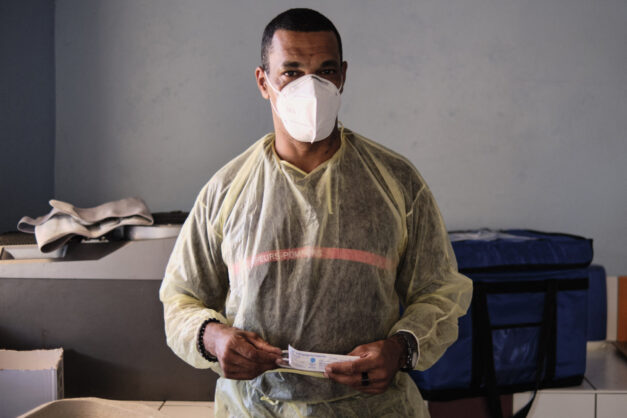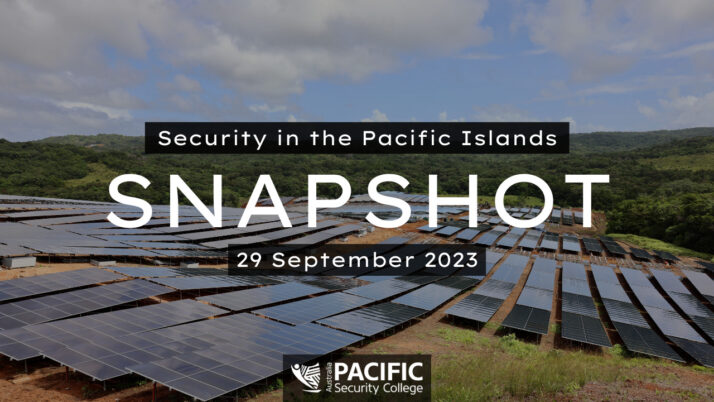Two years of COVID-19 in the Pacific: What’s happened, and what comes next?

Photo: AFP
Two years on from the first COVID-19 case in the Pacific, the pandemic’s impact on the social, political and economic fabric of the region continues to resonate, Maxim Wiggins writes.
On 11 March 2020, after a visit to Paris, Member for French Polynesia in the French National Assembly Maina Sage became the first known positive COVID-19 case in the Pacific.
24 months on, the virus remains persistent in the region. Only the Federated States of Micronesia, Nauru, Tuvalu and Tokelau have recorded zero cases throughout the duration of the pandemic, with Samoa, Niue and the Marshall Islands seeing no community transmission. According to the World Health Organization (WHO), alongside the British Overseas Territories of the Pitcairn Islands and Saint Helena, they are the only COVID-19-free countries in the world.
A large part of the Pacific’s success can be attributed to swift and sustained border closures beginning in March 2020, which saved the region from the initial spread of the virus. On 8 March that year, the Marshall Islands was the first country in the Pacific to shut its international borders. This was followed by Samoa, Tonga, Vanuatu, the Solomon Islands and others.
Countries that reopened their borders in 2020, including the French Pacific territories of French Polynesia and New Caledonia, saw widespread infections in that year, without the assistance of vaccines to mitigate cases, hospitalisations or deaths. Low testing rates masked the high spread of COVID-19 in many nations, especially in Papua New Guinea (PNG).
In the context of the pandemic, 2021 might be defined as the year of the vaccine. Palau, Guam, Niue and Cook Islands have some of the highest rates of vaccination in the world, in part due to their close relationships with New Zealand and the United States. Moreover, Fiji, Tonga, Samoa, and Marshall Islands have used effective mobilisation campaigns to inoculate over 90 per cent of their target populations.
Meanwhile, countries like Solomon Islands and Vanuatu have had stagnant vaccine rollouts, whilst PNG’s worrying total vaccination rate of three per cent is amongst the lowest in the world.
The various successes and failures of the vaccine rollout in the Pacific showed the importance of a unified response to this multi-faceted security challenge. Despite the now plentiful vaccine supply, Pacific governments have faced challenges in combatting the spread of misinformation, which has been compounded by the logistical challenges of vaccinating remote areas.
Domestic experiences and policy responses to the virus have varied across the region. Fiji entered lockdown in April 2021, after avoiding community transmission for a year. New Caledonia was hit by a deadly wave of the Delta variant in September of that year, and the Omicron variant ended the COVID-19-free status of American Samoa, Cook Islands, Tonga, Vanuatu, Kiribati, Niue and Solomon Islands.
Despite having more than 18 months to prepare for the virus’ entry, countries struggled to deal with widespread transmission, as the virus leaked out of quarantine facilities and into communities. More recently, the confusion and misinformation surrounding Vanuatu’s community transmission demonstrates how challenging it is for Pacific leaders to tackle the virus on health, logistical and digital fronts.
There are also issues in managing the virus as it shifts from the pandemic to endemic phase. Dr James Fong, Permanent Secretary for Health in Fiji, argued that his country must maintain a ‘vaccine plus’ approach by combining a highly vaccinated population alongside masking, physical distancing and ventilation. However, we are yet to see if there is political will to maintain these measures long-term.
Economically, Pacific Island countries remain vulnerable. Although nations such as Fiji and the Cook Islands were able to reopen their international borders, most countries are still shut off from the rest of the world, depriving them of vital tourist dollars. It has meant that countries have had to look at alternative streams of revenue, as shown by Tuvalu renegotiating its .tv web domain deal, Vanuatu expanding its ‘golden passport’ scheme, and even Tongan leaders introducing a bill in parliament to make the cryptocurrency Bitcoin legal tender.
Despite these efforts, more pain may be ahead, with the economic impact of Russia’s invasion of Ukraine likely to trickle in to the Pacific, raising the cost of living and undermining food security.
Impacts on young people have been an often forgotten side effect of the pandemic. The closing of schools in Fiji from April 2020 to January 2022 was emblematic of how the pandemic impacted students in countries with the largest amounts of community transmission.
Aside from its economic impacts on employment and study opportunities, the social isolation and anxiety of COVID-19 has increased the vulnerability of young people to mental health problems. The Pacific, with more than 50 per cent of its population under the age of 23, must consider these challenges alongside others in rebounding from the pandemic.
So, where to next for the Pacific? COVID-19 is not going away and will continue to place strain on national health systems. However, having focused so much of their resources on the pandemic since 2020, countries must confront other security challenges impacting their people. Climate change, non-communicable diseases and transnational crime are just some of the complex challenges facing the region in 2022, and Pacific governments must pivot to tackle these issues in earnest.
The WHO has called 2022 the year the world must end the pandemic. Pacific countries will be hoping that this prediction rings true, so that they can reconnect to the world and each other.
Maxim Wiggins
This piece was first published on Policy Forum.
More Stories

Security Snapshot - 28 Mar 2024
Pacific Security Snapshot | 28 March 2024
Summary ➣ Heavy rains, floods, landslides and earthquakes batter the region ➣ Pacific submissions to the International Court of Justice (ICJ) on climate change responsibility ➣ Elections across the Pacific prompting changes to diplomatic relations and security arrangements ➣ Challenges for women in politics Climate Security Lives have been lost in PNG after a series…

Security Snapshot - 29 Sep 2023
Pacific Security Snapshot | 29 September 2023
The security stories shaping the region ➣ 2nd United States-Pacific Islands Forum Summit ➣ Niue and Cook Islands forge diplomatic ties with United States ➣ Chinese navy vessel arrives in Papua New Guinea ➣ Pacific climate change advocacy at the United Nations ➣ El Niño is officially declared ➣ Fifteenth Pacific Health Ministers Meeting in…






